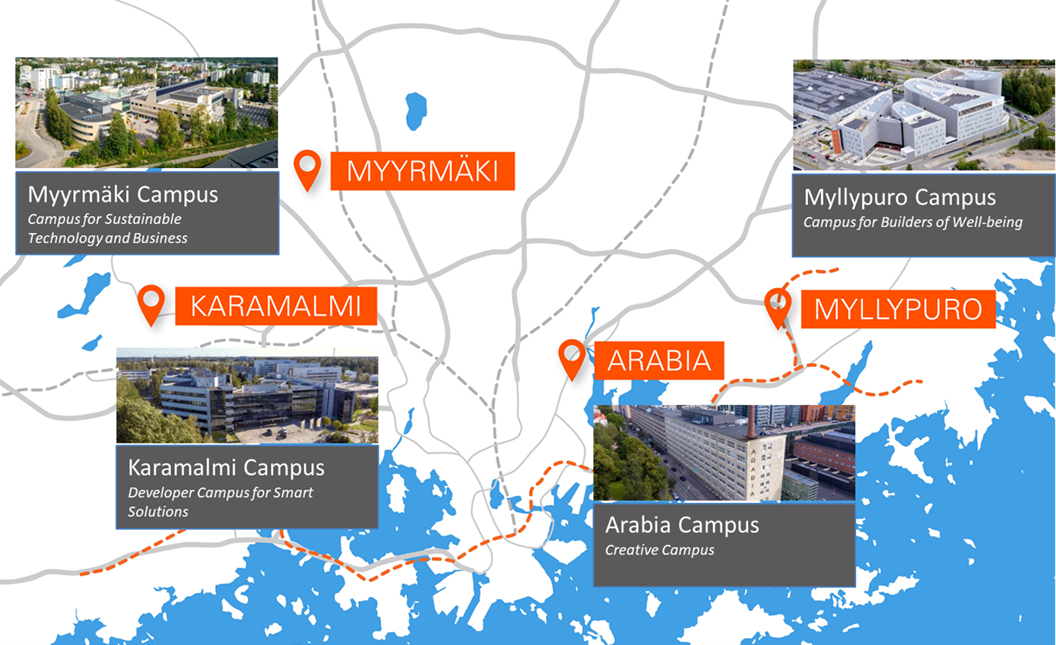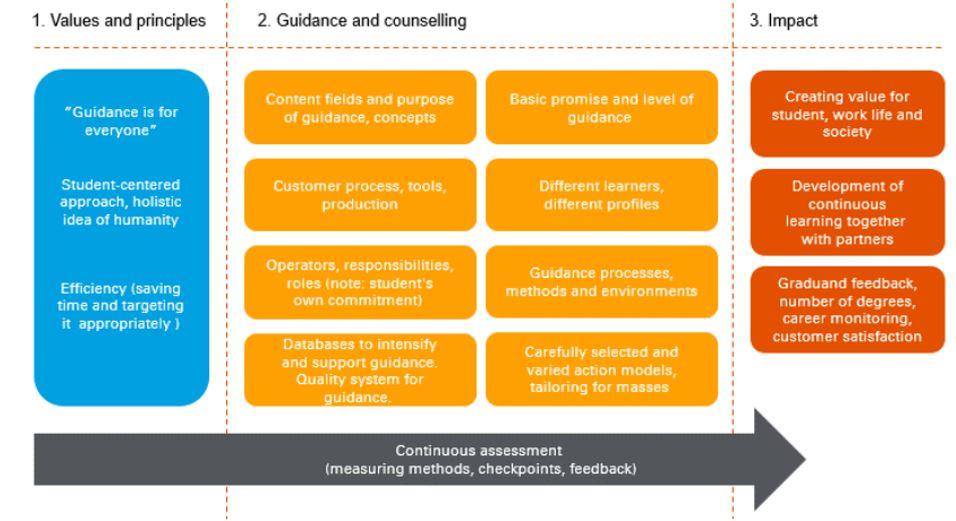Korkeakoulun itsearviointi
Goal orientation supported in various stages of studies
Metropolia has created various tools and practices to strengthen its student-centered approach. Degree students participate in an orientation specific to each degree programme to strengthen their study skills. Competency matrices linked to the curricula offer a competence-based description of the development of expertise during education. Study Guide describes the curricula and individual courses. The implementation and assessment plans that are in line with the curriculum describe the practical arrangements for teaching and learning. During the courses, students have the right to receive feedback on their performance, have access to their evaluations and receive information on the evaluation criteria. The feedback methods vary by sector and degree programme.
Students can flexibly choose courses from the CampusOnline catalogue and from the offering of an extensive partner network (3UAS, 5UAS, cooperation with Aalto University and the University of Helsinki, international partners, U!REKA) and accumulate studies through work-based learning or RDI projects. An international aspect for the studies is provided in the form of student exchange, work placements abroad, optional language studies, foreign-language teaching and tutoring international students, for instance. There are student exchange agreements in place with approximately 300 foreign HEI partners.
During studies, students develop their working life skills and strengthen their connections to the business world through a work placement (part of the studies), thesis work and multidisciplinary innovation project studies (MINNO, 10 credits). The thesis work process is supported by the digital Wihi system. Connection to the business world is also achieved through degree-specific means, such as active alumni connections or in futures seminars attended jointly by students and representatives of professional life.
Metropolia offers advanced learning environments to students on all campuses (figure 6). The environments provide opportunities to organize simulations of various fields of education and to practice in environments that fully correspond to working life environments. Students have actively participated in designing these facilities. One example of these is the HyMy Village (see 2.4). There are also digital learning environments, such as Moodle.

Figure 6 Metropolia’s four campuses
Guidance and counselling and student services promote studies and maintain well-being
Students have been assigned PSP (personal study plan) counsellors for their degree programmes to help them progress in their studies. The counsellors conduct personal study plan discussions with the students. A PSP counsellor monitors the progress and refers the student to a student well-being advisor or a psychologist in the Student Well-being Services, if required. In addition, the student is provided support and guidance in their studies in the degree programmes (programme coordinators, academic tutors and study counsellors). Titles and practices vary between sectors and degree programmes. The Opo application, which is currently undergoing testing, helps a new student find information and receive guidance at the beginning of the studies by means of a service recommendation feature.
In a self-assessment, the need to monitor studies in a student-centered, more personalized and more comprehensive manner was identified. Doing so would make it easier to address a situation where the study progress is slower than planned, for example. An answer to this is provided by the learning guidance model (figure 7) which is being developed together with students as part of the Metropolia Match® model. The model makes use of existing good practices. The guidance model supports the student’s active approach in self-development and in progressing towards the direction they have chosen.

Figure 7 Student-centered guidance model at Metropolia
The student services coordinators in the Student and Admission Services provide study guidance to those interested in Metropolia’s offering. SIMHE (Supporting Immigrants in Higher Education) guidance and services for the identification of prior learning are available to immigrant customers. The SIMHE service activities that are today provided nationally in various higher education institutions were initiated by Metropolia in 2016 to address the refugee situation of that time.
Metropolia’s Academic Services, or Student and Admission Services, Student Well-being Services, International Relations and the Library and Information Services, serve applicants, students and personnel on all four campuses. Special needs teacher services are offered on a school-specific basis. The Student Well-being Services promote the well-being of students in cooperation with education. Student well-being advisors, psychologists and a well-being coach provide personal guidance via online discussions and on campus, facilitate small groups and distribute information related to student well-being. Metropolia’s degree students are covered by student health care services (YTHS). University chaplains are also available to support student well-being.
Student admission and RPL are transparent
Student admissions are based on the national joint admission process for higher education institutions, developed under Metropolia’s leadership, and a joint electronic entrance examination. The responsibilities and processes related to student admission are included in Metropolia’s degree regulations. The admission criteria for each study programme available for application are drawn up in the steering group for student admission, which ensures that applicants are treated equally. The Director of Lifelong Learning makes the decisions on the policies concerning student admission and the selection criteria. The Student and Admission Services apply a centralized method in the publishing of degree-awarding programmes and other studies that are available for application. Information on the criteria applied in any admission decisions and the admission criteria is available to applicants at Opintopolku.fi and Metropolia.fi. The student admission criteria related to the provision of lifelong learning and the open UAS studies are available in the Peppi system. This is also where applicants submit their applications for these options. An area of identified enhancement is the need to assemble all admission-related information in one place.
The degree regulations outline the identification and recognition of prior learning (RPL). The student initiates the process of RPL. A uniform electronic RPL form (eAHOT) is used to apply for the recognition of prior learning. Any prior learning shall be confirmed and acknowledged by the teacher responsible for the course or a person designated by the head of the degree programme. The degree-specific RPL principles are published in OMA (Metropolia’s intranet). The RPL process is applied in studification. In self-assessment, it was recognised that there is a need to separate studification into its own process. This allows various methods of learning on the job to be identified and developed more systematically.
| Strengths |
Enhancement areas |
| Campuses equipped with modern, relevant learning environments, designed together with students. |
A system for monitoring progress for both students and personnel. |
| Competency matrices are a part of curricula. |
Process and methods for studification. |
| Admission criteria for each application period are prepared in a coordinated manner in degree programmes in line with Metropolia’s policies and published before the application period begins. |
Information related to admissions should be stored in one place. |
| Multidisciplinary and highly networked student well-being services. |
|
| Extensive educational offering (see 1.4) provides degree programme students and other learners with numerous opportunities to study. |
|
Metropolia supports transparent students’ admission and competence-based flexible study paths
Metropolia has clear guidelines and procedures for student admission. All relevant information on student admission and the progression of studies is included in Metropolia’s degree regulations so that the information regarding the recognition of prior learning is easily accessible and transparent on Metropolia’s website—in both Finnish and English.
In the interviews, it also became evident that these regulations are primarily used in practice. A particular example is the SIMHE project, where Metropolia provides immigrant students with counselling and services for the identification of competences which could be subject to recognising prior learning (RPL). However, the auditors also received a few indications from the student interviews that the RPL is based on individual judgement and may therefore vary in accordance with the individual interpretation of regulations. Regarding recognising prior learning, Metropolia should ensure a common understanding and consistency among administrative and academic personnel.
Education supports target-oriented learning
According to Metropolia’s strategy, the focus is on student-centred teaching, learning processes and the diversity of students and their needs. Interviews with teachers and students confirm that the intended learning outcomes and student life cycles are well organised. Metropolia offers students a sufficiently solid subject-specific core, which enables the students to reach the envisaged learning outcomes. This approach complies with intending to offer students different disciplinary perspectives.
The audit team learned that the flexibility of the curriculum and a good mix of compulsory and eligible modules, which the students appreciate, allows students to realise the programmes’ intentions. Students can create their own course portfolios and choose classes from different disciplines or higher education institutions.
Studies are integrated well with working life through learning environments
The audit team acknowledges that study modules involve critical reflection on key topics, verbal discussion and the written analysis and interpretation of the relevant material. Lectures, staff-led seminars and project work promote general intellectual and domain-specific skills. The audit team appreciates the contextual and phenomenon-based approach and the workshop-based teaching methods, especially through a work placement (part of the studies), thesis work and the already mentioned multidisciplinary innovation project studies (MINNO, 10 ECTS). Different stakeholders mentioned the latter during the workshops and interviews. Other examples are the HyMy Village and Helsinki XR Center, which enable students to gain first-hand experiences, giving the programmes a more practical dimension compared to other similar programmes.
The teaching-learning environment at Metropolia is very supportive of students’ personal (transferable) skills development. The audit team applauds how students’ critical thinking is developed, which the students and alumni confirmed during the site visit. The audit team highly values the modern, responsive programmes besides the advanced learning environments and facilities Metropolia has at its disposal. Its connections to national and European innovation environments through different collaboration platforms or hubs are highly valued.
The amount and variety of activities that the higher education institution carries out together with civil society are impressive. In the view of the auditors, this is a great asset for integrating students with professional life. All Metropolia students have the chance to be involved in research projects to improve their research capabilities, including data collection, data entry or database interventions.
From the audit team’s perspective, Metropolia cares for its students and shows interest in their success: The HEI continuously observes the students’ learning processes, and problems and difficulties are dealt with in cooperation between students, student services and academics with the help of the METKA student union.
METKA also plays an active role in making decisions to ensure student fairness. However, students stressed that there are still minimal actions from METKA concerning improving administration. The METKA student union plays an essential role in students’ study lives. It can increase feelings of connection or engagement with the university, thus reducing the likelihood of study failure and dropout.
The well-being of students is promoted, yet there is some room for improvement
At Metropolia, students are assigned personal study plans and counsellors for their degree programmes to help them progress. In addition, tutor teachers monitor their progress and refer the student to a student well-being advisor or a psychologist in Student Well-being Services, if needed. The interviews revealed as well that teachers give regular feedback on learning achievements. Regarding students with special needs, support staff explained that their unique needs are included in the central database upon official registration as a Metropolia student.
The audit team also identified issues for improvement, particularly in terms of involving students actively in HEI life and enhancement processes. There are, for example, no English versions of questionnaires for certain degree-specific survey, which makes it difficult, if not impossible, for students with limited or no Finnish skills to express their opinions. Metropolia should ensure accessibility to active participation in student life for this target group in all degree programmes, especially if more international students are supposed to attend Metropolia in the future. Their voices should be heard as well.

